Warner Bros. has released deluxe editions of the Rankin/Bass animated films of The Hobbit (1977) and The Return of the King (1980). It is only available to purchase in North America.
The Hobbit Synopsis
The place is Middle Earth [sic]. The time is long ago, when humans shared their days with elves, wizards, goblins, dragons, heroes…and hobbits. Bilbo Baggins is a hero and a hobbit, a roundish, peaceable homebody going on a dangerous quest – even though adventures make hobbits late for dinner!
In this enchanting adaptation of the first installment [sic] of J.R.R. Tolkien’s classic The Lord of the Rings trilogy, Bilbo the hobbit is asked to recover a fabulous treasure stolen from friendly dwarfs. All he must do is brave dark forests, towering mountains, hobbit-eating trolls, huge spiders, a fiery dragon and more. Fun and amazement await – so join the quest!
The Return of the King Synopsis
Frodo the Hobbit, the remarkable hero of J.R.R. Tolkien’s The Lord of the Rings trilogy, battles more evil forces plaguing Middle Earth [sic] in The Return of the King.
The Magic Ring of The Hobbit has now become the Ring of Doom – and to restore peace it must be destroyed in the raging fires in which it was made. Chosen for the task, Frodo and faithful servant Samwise face grave perils – the worst of which is the ring’s terrible power to possess its wearer. Will Frodo give in to the madness of the ring….or will he fulfill [sic] his quest?
Review
Reviewed by Daniel Helen
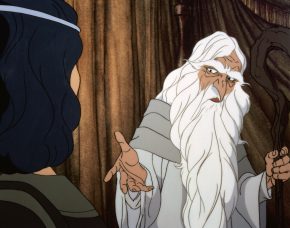 The two films are very much a product of their time and place, being produced for American television over thirty years ago. This largely explains their particular quirks.
The two films are very much a product of their time and place, being produced for American television over thirty years ago. This largely explains their particular quirks.
Most obviously, the use of American voice actors seems quite strange. It may just be that as a British viewer – who is used to the mainly British accents in the Peter Jackson films, the 1968 BBC radio Hobbit, and the Brian Sibley Lord of the Rings radio adaptation – the American accent is unfamiliar. But there’s probably something deeper here. The Hobbit and The Lord of the Rings were deeply influenced by the cultures and mythologies of northern Europe. The use of American accents in a world which has the feel of medieval and pre-medieval Europe makes it hard to suspend disbelief, especially when characters use phrases like “he’s gone loony” and even “Frodo lives!” (repeatedly).
The pronunciation was not perfect. Smog for Smaug (although it seems Smaug pronounces his own name correctly). Sawron for Sauron. Sirith Ungol for Cirith Ungol. And Minus Tirith for Minas Tirith. Religious phrases are used throughout. There’s “god help us!”. And Grond is described “like the arm of the devil himself”. Similarly revealing of American (legal) culture, Thorin reiterates that “we do have a contract” when Bilbo is hesitant on the doorstep to the Lonely Mountain.
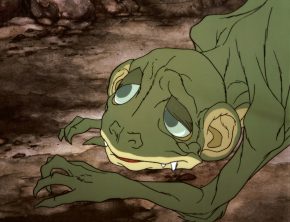 With regard to The Hobbit, the adaptation of the story is largely faithful. Certain elements are removed (like Beorn), but these are quite defensible (Gandalf’s elongated introduction of the Company to Beorn would not work well on film). But it is less easy to defend the almost complete removal of Bilbo’s character development. There’s no real Took/Baggins conflict at the Unexpected Party; his going on the adventure is a foregone conclusion. The only moment of inner debate comes as Bilbo enters the Lonely Mountain.
With regard to The Hobbit, the adaptation of the story is largely faithful. Certain elements are removed (like Beorn), but these are quite defensible (Gandalf’s elongated introduction of the Company to Beorn would not work well on film). But it is less easy to defend the almost complete removal of Bilbo’s character development. There’s no real Took/Baggins conflict at the Unexpected Party; his going on the adventure is a foregone conclusion. The only moment of inner debate comes as Bilbo enters the Lonely Mountain.
There are certain oddities in the animation and sound effects along the way. Elrond appears to have a halo of stars. The Wood-elves are portrayed as ugly grey creatures (I almost wrote “grey ugly creatures” – what is wrong with “green great dragon”?). Smaug is more a cat than a reptile. Whenever the ring or an elven sword is used there’s a very 1970s sci-fi sound effect.
Overall, The Hobbit is an enjoyable shortish film. The same cannot be said for The Return of the King, however. Its fundamental flaw is the complete omission of volumes one and two of Tolkien’s The Lord of the Rings (which is not, after all, a trilogy, but a single work). The film is extremely confusing. It lacks a coherent structure. This is no doubt exasperated for those familiar with the book.
We start at Rivendell after the ring’s destruction. Bilbo wants to know how Frodo lost his finger and so a minstrel of Gondor starts to sing the tale. Gandalf randomly decides that the ring must be destroyed (he hinted as much at the end of The Hobbit film). It then cuts to Frodo and Sam at Cirith Ungol. Then there’s an opening sequence which shows Frodo and Sam leaving the Shire. It then settles down somewhat after this, but it remains confusing.
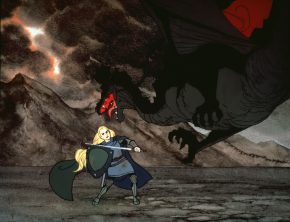 Elements from earlier in The Lord of the Rings are forced in with little or no explanation. Galadriel’s phial just appears when needed. Theoden and Rohan are given brief backgrounds to setup their arrival on the Pelennor. Eowyn arrives on screen just to kill the Witch-king. Gollum shows up essentially to just destroy the ring. Even Aragorn, the titular character, is granted limited screen time and background information.
Elements from earlier in The Lord of the Rings are forced in with little or no explanation. Galadriel’s phial just appears when needed. Theoden and Rohan are given brief backgrounds to setup their arrival on the Pelennor. Eowyn arrives on screen just to kill the Witch-king. Gollum shows up essentially to just destroy the ring. Even Aragorn, the titular character, is granted limited screen time and background information.
While the inclusion of Tolkien’s songs and poems in both films is laudable, the execution is not. The music is distinctly not Tolkienian. It is not just repetitive, it is annoyingly repetitive, especially in The Return of the King. As the Gondorian minstrel sings “Frodo of the nine fingers and the ring of doom” countless times, you’ll be humming it for days!
Warner Bros. are marketing these DVDs as “deluxe” editions. There is nothing particularly deluxe about them. The DVD cases are a bit more flimsy than usual, but there is a cardboard slip-on with a well-designed cover. The “Tolkien and Film Maker Highlights” special features amount to a few screens on the DVD with facts about Tolkien’s life and information on the cast and crew. Bizarrely, the DVDs also include several Bugs Bunny short films.
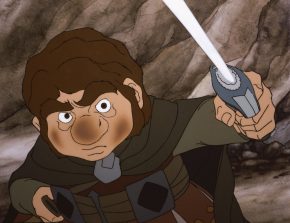 The Hobbit and The Return of the King are certainly classic in the sense that they have to be watched with an appreciation of their provenance. For Tolkien fans, they are of particular interest as attempts at adapting Tolkien’s works. The changes made in the Rankin/Bass Hobbit should form a larger part in discussions about the current Peter Jackson adaptation. It would have been better if Warner Bros. had released the two films on the same DVD, or at least the same box. Overall,The Hobbit is worth watching (despite the songs) as a short film which captures the delightful nature of the original story. The Return of the King, sadly, is not (largely because of the songs!).
The Hobbit and The Return of the King are certainly classic in the sense that they have to be watched with an appreciation of their provenance. For Tolkien fans, they are of particular interest as attempts at adapting Tolkien’s works. The changes made in the Rankin/Bass Hobbit should form a larger part in discussions about the current Peter Jackson adaptation. It would have been better if Warner Bros. had released the two films on the same DVD, or at least the same box. Overall,The Hobbit is worth watching (despite the songs) as a short film which captures the delightful nature of the original story. The Return of the King, sadly, is not (largely because of the songs!).
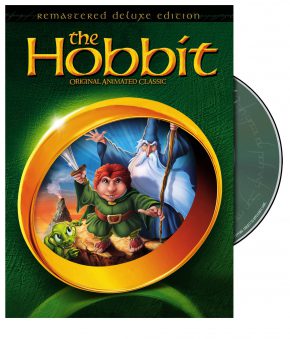 The place is Middle Earth [sic]. The time is long ago, when humans shared their days with elves, wizards, goblins, dragons, heroes…and hobbits. Bilbo Baggins is a hero and a hobbit, a roundish, peaceable homebody going on a dangerous quest – even though adventures make hobbits late for dinner!
The place is Middle Earth [sic]. The time is long ago, when humans shared their days with elves, wizards, goblins, dragons, heroes…and hobbits. Bilbo Baggins is a hero and a hobbit, a roundish, peaceable homebody going on a dangerous quest – even though adventures make hobbits late for dinner!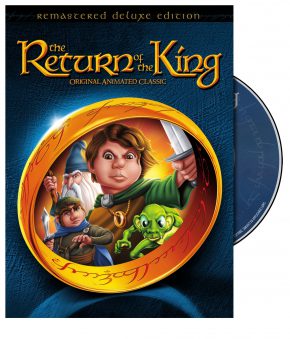 Frodo the Hobbit, the remarkable hero of J.R.R. Tolkien’s The Lord of the Rings trilogy, battles more evil forces plaguing Middle Earth [sic] in The Return of the King.
Frodo the Hobbit, the remarkable hero of J.R.R. Tolkien’s The Lord of the Rings trilogy, battles more evil forces plaguing Middle Earth [sic] in The Return of the King.